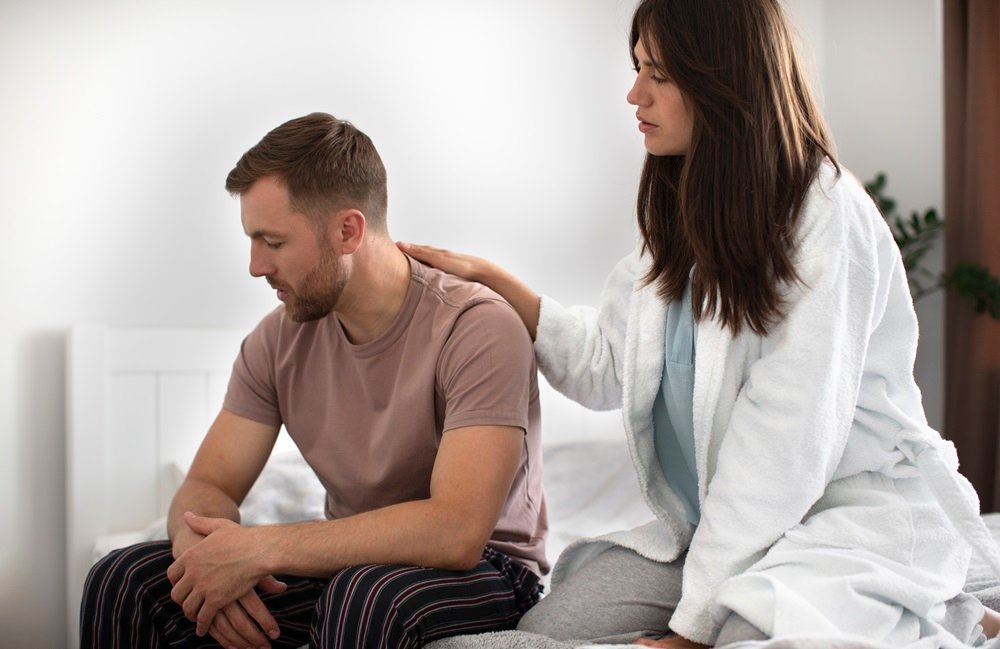You wake up one morning and realize something’s different. That spark you once had? It’s dimmed.
Your partner notices too, but nobody talks about it. Low libido creeps in slowly, and suddenly you’re wondering what happened to the person you used to be.
This isn’t just about getting older. Your body is fighting a three-way battle against time, biology, and the demands of modern life.
The Age Factor: When Your Body Starts Saying No
Your sexual health doesn’t just disappear overnight. It erodes gradually, starting in your 30s and accelerating through your 40s and beyond.
Men see testosterone drop by 1-2% each year after age 30. That might sound small, but it adds up.
By 50, you could have 20-40% less testosterone than you did at 25. Women face their own challenge when estrogen levels plummet during menopause, often causing a dramatic shift in desire.
But here’s what most people don’t realize: your blood flow changes too. The arteries that supply blood to your sexual organs narrow over time. Less blood flow means weaker response, regardless of how much you want it mentally.
Your muscles also lose strength and flexibility. The pelvic floor muscles that support sexual function weaken, making orgasms less intense and erections less reliable.
Hormonal Havoc: The Chemical Messengers Gone Wrong
Hormones control more than you think. They’re like the backstage crew of a theater production – when they’re working well, everything flows smoothly. When they’re not, the whole show falls apart.
Testosterone and estrogen get most of the attention, but they’re not the only players.
Cortisol, your stress hormone, can shut down sexual desire faster than a cold shower. When you’re stressed, your body prioritizes survival over reproduction.
| Hormone | Normal Range | Impact on Sexual Health |
| Testosterone (Men) | 300-1,000 ng/dL | Drives desire, supports erections |
| Estrogen (Women) | 15-350 pg/mL | Affects lubrication, arousal |
| Cortisol | 10-20 mcg/dL | High levels kill libido |
Insulin resistance also plays a role. When your body struggles to process sugar, it affects blood flow and nerve function. This is why people with diabetes often experience sexual problems.
Sleep hormones matter too. Poor sleep disrupts the production of growth hormone and testosterone, both crucial for sexual health. If you’re getting less than 7 hours of quality sleep, your sex drive pays the price.
Modern Life: The Passion Killer
Your ancestors didn’t have to deal with what you face every day. Modern life is designed to kill your sex drive, and it’s doing a pretty good job.
You’re constantly connected. Your phone buzzes with notifications even during intimate moments. Your brain never gets a break from stimulation, making it harder to focus on physical sensations.
You sit too much. The average person sits for 9-10 hours daily. This compresses blood vessels and weakens the muscles you need for sexual function. Your pelvis gets tight, reducing blood flow to all the important areas.
You eat processed food. Most of what’s in your grocery store didn’t exist 100 years ago. These foods spike your blood sugar, increase inflammation, and mess with your hormones. High-sugar diets can reduce testosterone by up to 25%.
You don’t move enough. Regular exercise increases blood flow, boosts hormones, and improves body image. But 80% of adults don’t get enough physical activity. Your cardiovascular system suffers, and so does your sexual performance.
The Stress Connection: How Pressure Kills Performance
Chronic stress is like having your foot on the brake while trying to accelerate. Your body can’t be in fight-or-flight mode and reproductive mode at the same time.
When you’re stressed, your adrenal glands pump out cortisol. This hormone directly suppresses the production of sex hormones. It’s your body’s way of saying “now is not the time to make babies.”
Work stress is particularly damaging. People who work more than 50 hours per week report significantly lower sexual satisfaction. The mental load of constant deadlines and responsibilities leaves little energy for intimacy.
Financial worry compounds the problem. Money stress can reduce sexual frequency by 30-40% in couples. When you’re worried about paying bills, your brain isn’t focused on pleasure.
The Cascade Effect: How Everything Connects
These factors don’t work in isolation. They create a domino effect that makes everything worse.
Poor sleep leads to weight gain, which affects self-image and hormone production. Stress causes poor food choices, which spike blood sugar and increase inflammation. Lack of exercise worsens sleep quality, creating a vicious cycle.
Your relationship suffers too. When you’re not interested in sex, your partner feels rejected. This creates tension, which increases stress, which further reduces desire. The cycle continues until someone breaks it.

Breaking Free: Small Changes, Big Results
You don’t need to overhaul your entire life overnight. Small, consistent changes can restart your sexual health engine.
Start with sleep. Get 7-8 hours nightly. Your body produces most of its sex hormones during deep sleep. No screens for an hour before bed, and keep your bedroom cool and dark.
Move more. Even 20 minutes of walking daily improves blood flow. Strength training twice weekly can boost testosterone naturally. Men who exercise regularly have 30% higher testosterone levels than sedentary men.
Manage stress actively. Find what works for you – meditation, yoga, or just deep breathing for 5 minutes daily. Chronic stress management can improve sexual function within 6-8 weeks.
Eat real food. Focus on whole foods that don’t need ingredient lists. Reduce sugar and processed foods that spike inflammation and disrupt hormones.
Your sexual health reflects your overall health. When you take care of your body, your low libido often improves naturally. The key is consistency, not perfection.
You deserve to feel desire again. Your body wants to cooperate – you just need to give it the right conditions to thrive.
Frequently Asked Questions
What causes low libido in men and women?
Answer:
Low libido can result from hormone imbalances (like low testosterone or estrogen), stress, poor sleep, inactivity, processed foods, and chronic medical conditions. Age-related changes also reduce blood flow and sensitivity, affecting desire.
Can stress really lower my sex drive?
Answer:
Yes. Chronic stress raises cortisol, which suppresses the production of sex hormones like testosterone and estrogen. It also disrupts sleep and encourages poor lifestyle choices—all of which further reduce libido.
How does sleep affect libido?
Answer:
Your body produces most of its sex hormones during deep sleep. Poor sleep lowers testosterone and growth hormone levels, reduces energy, and worsens mood—all of which negatively impact sexual desire.
Is low libido a normal part of aging?
Answer:
Aging affects libido due to hormone declines and reduced blood flow, but it’s not inevitable or untreatable. Lifestyle changes, stress management, and hormonal support can help reverse it.
What lifestyle changes can help restore libido?
Answer:
Regular exercise, better sleep, stress reduction, and a whole-food diet can significantly improve libido. Even small changes like walking daily or cutting back on sugar can boost hormone levels and sexual function.
Can sitting too much really affect my sex life?
Answer:
Yes. Prolonged sitting compresses blood vessels and weakens pelvic floor muscles, which are essential for sexual performance. Moving more helps restore blood flow and hormone balance.
How can I naturally increase testosterone or estrogen?
Answer:
You can support healthy hormone levels with strength training, good sleep, whole foods, and reducing alcohol or sugar. Managing stress also supports endocrine balance naturally.
When should I see a doctor about low libido?
Answer:
If low libido lasts more than 2–3 months despite lifestyle changes, or it’s causing distress in your relationship, consult a healthcare provider. You may need hormone testing or counseling.



